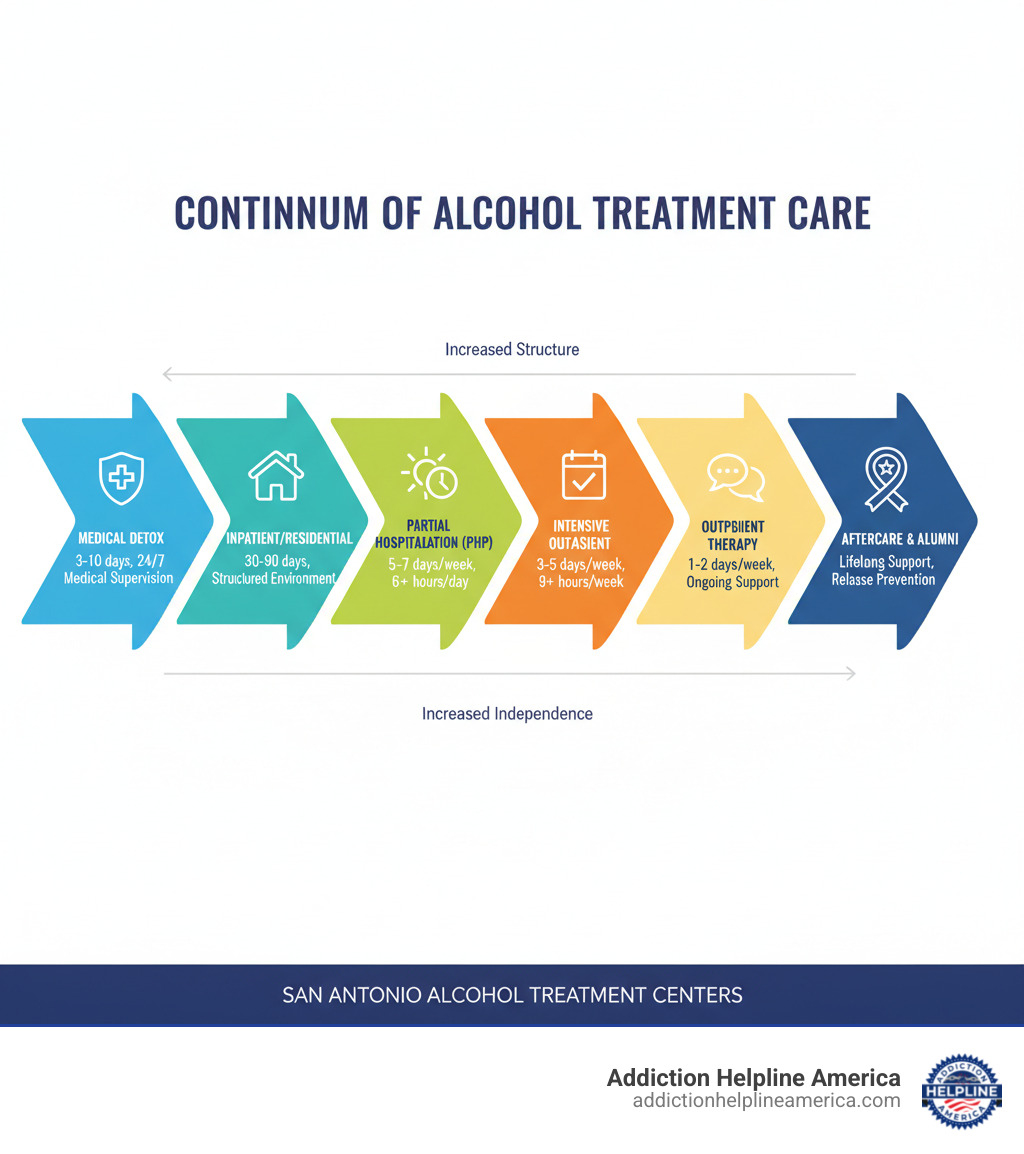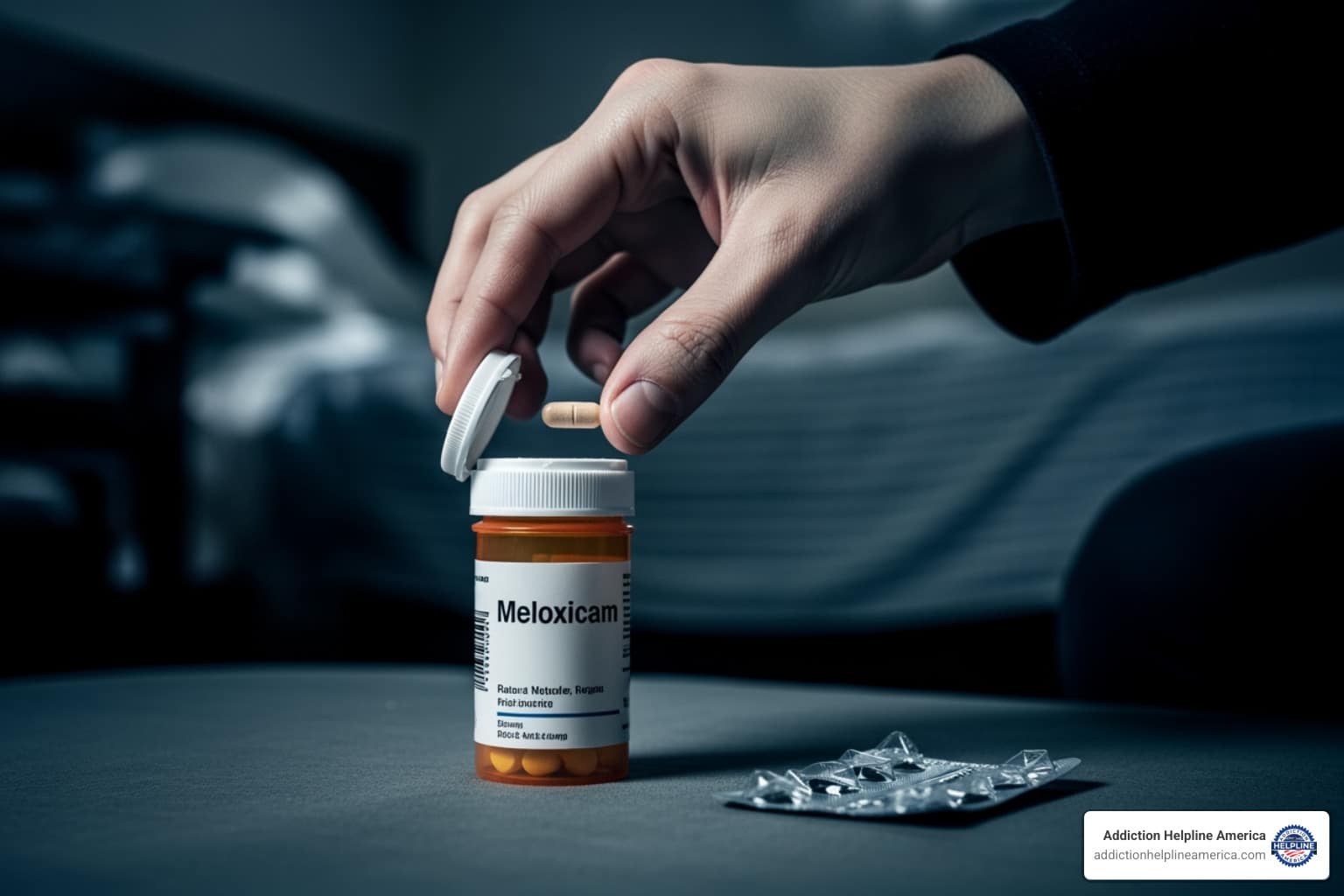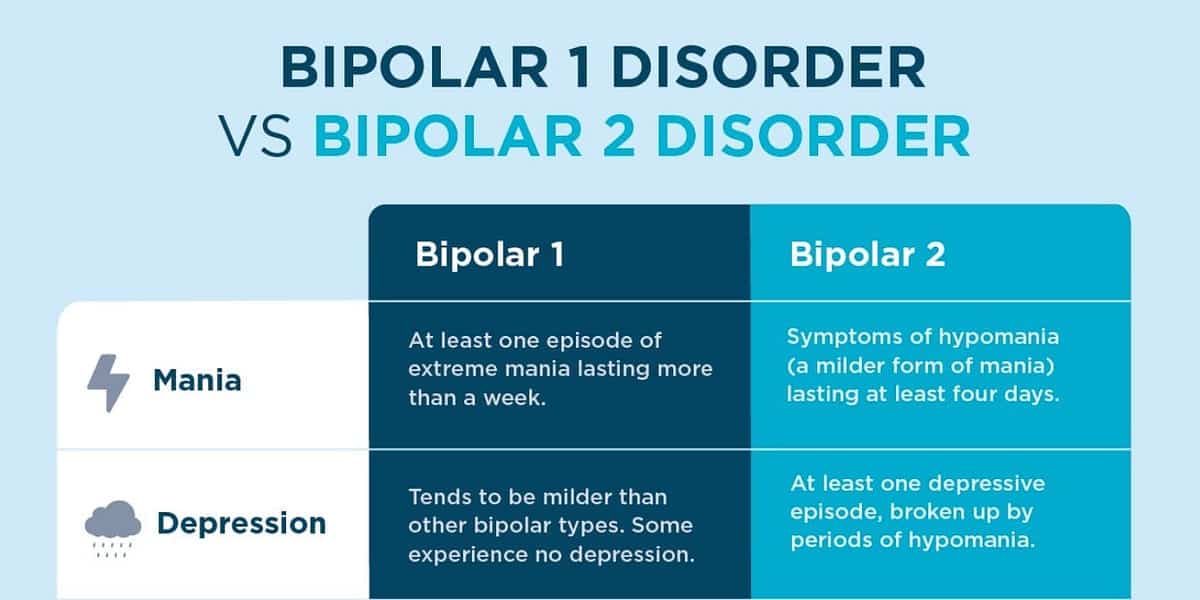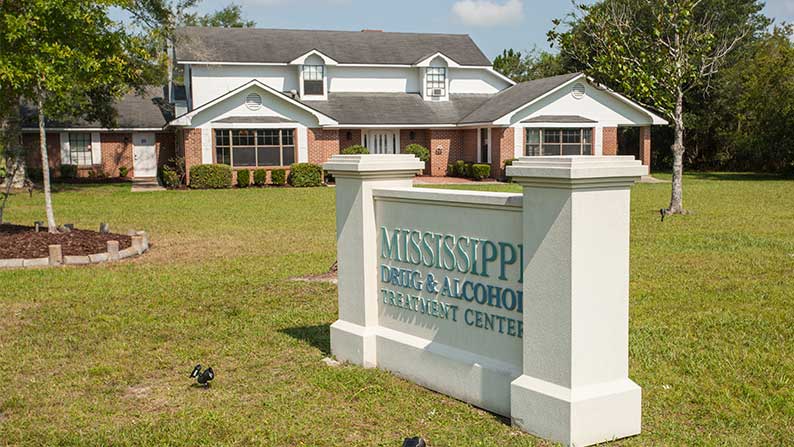
Why Finding the Right Alcohol Treatment Center Matters
San antonio alcohol treatment centers provide a full spectrum of services to help individuals overcome alcohol addiction. If you’re searching for help in San Antonio, here’s a quick overview of your options:
- Medical Detox: Safe, supervised withdrawal with 24/7 medical care.
- Inpatient/Residential: Immersive 30-90 day programs in structured, healing environments.
- Partial Hospitalization (PHP): Intensive daytime treatment, allowing you to return home at night.
- Intensive Outpatient (IOP): Flexible programs that fit around work or family schedules.
- Outpatient Therapy: Ongoing weekly support to maintain sobriety.
- Specialized Programs: Care for dual diagnosis, trauma, and other specific needs.
Deciding to seek help is a courageous first step. San Antonio is home to numerous treatment centers with diverse approaches, from serene Texas Hill Country facilities to flexible city-based outpatient programs. With studies showing that over 90% of patients at quality residential programs maintain sobriety one year after completion, finding the right fit is crucial. Many centers accept insurance, and financial aid options are often available.
This guide will help you understand the levels of care, specialized therapies, and how to handle the logistics of choosing a San Antonio alcohol treatment center.
At Addiction Helpline America, we specialize in connecting people with treatment resources that match their unique needs. Our team offers compassionate, confidential guidance 24/7 to help you find the right san antonio alcohol treatment centers and begin your recovery journey.

Understanding the Levels of Alcohol Treatment Care
Recovery from alcohol addiction is not one-size-fits-all. San Antonio alcohol treatment centers offer a “continuum of care,” a range of options that can be customized to your needs. Your treatment plan may evolve as you progress, perhaps starting with intensive care and transitioning to more flexible programs.
Program durations vary, with some lasting 30 days and others extending to 60, 90, or more. Your treatment team will create an individualized plan to give you the best chance at lasting recovery.

Medical Detoxification: The First Step
Alcohol withdrawal can be dangerous and even life-threatening without proper management. Medically supervised detox is a crucial first step. In a detox facility, a team of doctors and nurses provides 24/7 care, monitoring your vital signs and using medication to ease withdrawal symptoms and prevent complications. This phase typically lasts three to ten days. The goal is to ensure you withdraw from alcohol safely and comfortably, preparing you for the next stage of treatment. Facilities like La Hacienda Treatment Center’s Special Care Unit provide this essential, individualized medical support.
Inpatient & Residential Programs: Immersive Healing
After detox, many people enter inpatient or residential treatment. These programs offer a 24/7 structured and supportive environment, removing you from daily triggers and stressors. Lasting 30 to 90 days, residential care allows you to focus entirely on healing in a therapeutic community.
Research shows that longer programs, especially those lasting 90 days, significantly reduce the risk of relapse. In San Antonio, some centers like La Hacienda are located on serene Texas Hill Country acreage, using the natural environment as part of the healing process. In this setting, you’ll attend therapy, learn coping skills, and address the root causes of addiction, building a strong foundation for recovery.
Outpatient Programs: Flexible Recovery Options
Outpatient programs provide professional treatment while you live at home, making them ideal for those with strong support systems or who need to maintain work and family responsibilities. They are also an excellent step-down from inpatient care.
- Partial Hospitalization Programs (PHP): The most intensive outpatient option, often running five days a week for several hours, like a full-time job focused on recovery. Blue Heron Recovery offers a PHP from 9 am to 3 pm, Monday through Friday.
- Intensive Outpatient Programs (IOP): A step down in intensity, IOPs provide substantial support with more flexible scheduling. Blue Heron Recovery’s Evening IOP, for example, allows clients to attend treatment after work. San Antonio Recovery Center also offers a Spanish-speaking IOP.
- Standard Outpatient Therapy: This involves less frequent sessions, such as weekly individual or group therapy, providing ongoing support as you steer life in recovery.
Specialized Programs at San Antonio Alcohol Treatment Centers
Effective recovery plans are not generic; they are custom to the individual. The best san antonio alcohol treatment centers understand that addiction affects the whole person and offer specialized programs to address unique needs.

Evidence-Based Therapies for Lasting Change
Quality treatment is built on therapies that are scientifically proven to be effective. Common approaches include:
- Cognitive-Behavioral Therapy (CBT): Helps you identify and change negative thought patterns and behaviors related to drinking. Both Blue Heron Recovery and San Antonio Recovery Center use CBT.
- Dialectical Behavior Therapy (DBT): Teaches skills for emotional regulation, distress tolerance, and mindfulness, which is especially helpful for those with intense emotions.
- Trauma-Informed Care: Creates a safe environment to address past trauma, a common root cause of addiction. Centers like SARC use this approach to prevent re-traumatization.
- Motivational Interviewing: A collaborative approach where therapists help you find your own internal motivation to change.
- Medication-Assisted Treatment (MAT): Combines counseling with FDA-approved medications (like Naltrexone, Acamprosate, or Antabuse) to reduce cravings and support recovery. Several local centers, including The Center for Health Care Services, offer MAT.
Dual Diagnosis: Treating Co-Occurring Disorders
Alcohol addiction often co-occurs with mental health conditions like anxiety, depression, or trauma. This is known as a dual diagnosis. Treating only the addiction while ignoring the underlying mental health issue is often ineffective. Integrated treatment, which addresses both conditions simultaneously, is crucial for lasting stability. Centers like Stone River Recovery Center and La Hacienda Treatment Center specialize in this comprehensive approach, combining clinical, psychiatric, and medical care.
Holistic Amenities and Unique Features
Healing involves the mind, body, and spirit. Many alcohol treatment centers in san antonio incorporate holistic amenities to support this process.

Some centers, like La Hacienda Treatment Center, leverage the natural beauty of the Texas Hill Country to create a restorative environment. Activities like yoga, meditation, and mindfulness help quiet the mind and regulate the nervous system. Innovative centers like E-Motion Wellness use physical movement, cold plunge therapy, and breathwork. Art, music, and fitness therapies provide alternative ways to process emotions and repair the brain. The overall atmosphere, from friendly staff to comfortable surroundings, plays a significant role in making recovery a positive experience.
Long-Term Recovery and Family Support
Recovery doesn’t end when you leave treatment. The best san antonio alcohol treatment centers prepare you for long-term success with robust support systems.
- Aftercare and Relapse Prevention: Before you leave, you’ll create a detailed plan that includes support groups, ongoing therapy, and strategies to handle triggers.
- Alumni Programs: These programs, like the one at San Antonio Recovery Center (SARC), create a powerful community for ongoing peer support and accountability.
- Sober Living Homes: These offer a structured, supportive bridge between residential treatment and independent living.
- Family Programs: Addiction impacts the entire family. Programs like the one at La Hacienda Treatment Center educate loved ones and help heal damaged relationships, which is often vital for a successful recovery.
At Addiction Helpline America, we can help you find a san antonio alcohol treatment center with the specialized programs that fit your needs, giving you the best chance at lasting recovery.
Navigating the Logistics: Cost, Insurance, and Choosing a Center
The decision to seek treatment for alcohol addiction is profound, and we know that figuring out the practical details can feel overwhelming. Questions about money and choosing the right center often loom large when you’re already dealing with so much. But here’s what we want you to know: help is available, and treatment is more accessible than you might think.
Making an informed choice about your care matters deeply. Understanding what quality looks like—including the importance of accreditation—can give you confidence as you move forward.

How to Pay for Alcohol Treatment in San Antonio
One of the first questions on most people’s minds is: “How will I pay for this?” It’s a valid concern, but there are actually many pathways to afford care at san antonio alcohol treatment centers.
Private insurance is often the first option to explore. Most private health insurance plans cover a significant portion of addiction treatment. In fact, within 25 miles of San Antonio, just under 70% of rehabs accept private insurance. Almost all health insurance providers now cover substance use disorder treatment under their plans, along with other mental health conditions. We always recommend reaching out to your insurance provider directly or letting the admissions team at a treatment center verify your benefits for you.
If you’re without private insurance, Medicaid and Medicare provide crucial coverage for many people. Over three-quarters of rehabs near San Antonio accept Medicaid, and roughly 36% accept Medicare. These government-funded programs are specifically designed to help low-income individuals, seniors, and people with disabilities access the healthcare they need.
State-funded programs are another important resource in Texas. These programs serve individuals who meet certain criteria, often based on income or lack of insurance. The goal is simple: ensuring that money doesn’t stand between you and the care that could save your life.
For those who prefer to pay directly or don’t have insurance coverage, self-pay options are available. Costs vary widely—outpatient detox programs typically run around $1,200, while residential inpatient services often exceed $10,000. Many centers also offer sliding scale fees, adjusting the cost based on your income and what you can realistically afford. Some facilities even partner with third-party lenders to provide financing plans, allowing you to pay in manageable installments over time.
Perhaps most importantly, some organizations explicitly state that no one is turned away due to lack of financial resources. This commitment to accessibility means that if you’re ready for help, there’s a way forward.
We’re here to help you explore these options and connect you with san antonio alcohol treatment centers that fit your financial situation. You can also learn more about what to expect financially on our page about how much do alcohol treatment centers cost.
Verifying Your Insurance for San Antonio Alcohol Treatment Centers
Once you know you have insurance, the next step is figuring out exactly what it covers. This process can feel confusing, but it doesn’t have to be complicated.
Contacting your insurance provider directly is often the quickest way to get answers. Call the number on the back of your insurance card and ask specifically about your benefits for substance use disorder treatment. You’ll want to know about coverage for inpatient care, outpatient programs, and detox services. Ask about your deductible, co-pays, and what your out-of-pocket maximum might be.
But you don’t have to steer this alone. Most san antonio alcohol treatment centers have dedicated admissions teams who do this work every day. They’re experienced at reading insurance policies and can provide a clear breakdown of what your plan will actually cover. Centers like Stone River Recovery Center and Blue Heron Recovery offer online tools or direct assistance specifically for verifying insurance, making the process much easier.
One important distinction to understand is whether a treatment center is in-network or out-of-network with your insurance plan. In-network providers typically mean lower out-of-pocket costs for you. However, many plans still offer some coverage for out-of-network services, so don’t rule out a facility just because it’s not in your network.
You’ll also want to understand any limitations your plan might have. Some insurance companies cap the number of treatment days per year or require documentation of medical necessity before approving treatment. This means a medical professional needs to determine that treatment is necessary for your health and safety—which, for someone struggling with alcohol addiction, is almost always the case.
If you have Aetna insurance specifically, we can help you find centers that work with your plan. Learn more on our page about alcohol treatment centers that accept aetna.
How to Choose the Right San Antonio Alcohol Treatment Center for You
With so many quality san antonio alcohol treatment centers available, how do you choose? The truth is, the “best” rehab isn’t the same for everyone—it’s the one that fits your unique needs, circumstances, and goals.
Starting with a professional assessment from a healthcare expert is crucial. This evaluation helps determine the severity of your alcohol use disorder and identifies any co-occurring mental health conditions. With this information, you’ll have a much clearer picture of which level of care—detox, inpatient, or outpatient—is right for you.
Program accreditation is a strong indicator of quality care. When a center holds accreditations from reputable organizations, it signals a commitment to high standards, safety, and ethical practices. The Joint Commission is an independent organization that accredits healthcare organizations and programs—San Antonio Recovery Center, for example, proudly holds this accreditation. CARF (Commission on Accreditation of Rehabilitation Facilities) is another respected international accreditor; Stone River Recovery Center is CARF accredited. While SAMHSA (Substance Abuse and Mental Health Services Administration) doesn’t directly accredit facilities, it provides valuable resources and guidelines for quality treatment. You can find more information about quality standards from professional organizations like NAATP.
Location and environment play a bigger role than you might think. Some people benefit from staying local, maintaining connections with family and support networks. Others find that traveling away from home—perhaps to the serene Texas Hill Country—provides helpful distance from triggers and familiar patterns. Consider whether you’re drawn to a peaceful, natural setting or prefer something more urban and accessible.
Think about your specialized program needs too. Do you need dual diagnosis treatment for co-occurring mental health issues? Are you looking for specific therapies like CBT, DBT, or medication-assisted treatment? Would holistic amenities like yoga, art therapy, or fitness programs improve your recovery experience? Some centers also cater to specific populations—men, women, LGBTQ+ individuals, or veterans—which might be important to you.
This is where Addiction Helpline America can help you find the right fit. We offer free, confidential, personalized guidance to help you steer all these choices. We understand the landscape of san antonio alcohol treatment centers and can connect you with facilities that match your specific clinical, financial, and personal needs. We’ll help you verify insurance, understand payment options, and find programs with the right accreditations and specialized services. Our network includes diverse centers offering comprehensive care, such as Sandstone Healthcare Charter School San Antonio Tx.
You don’t have to figure this out alone. We’re here to help you take that next step.
Frequently Asked Questions about Alcohol Rehab in San Antonio
Here are answers to some of the most common questions we receive about san antonio alcohol treatment centers.
How long does a typical alcohol rehab program last?
The length of treatment is custom to your individual needs. There is no single timeframe, but here are some general guidelines:
- Medical Detox: 3 to 10 days.
- Inpatient/Residential: 30, 60, or 90 days. Longer stays are often linked to better outcomes.
- Outpatient (PHP/IOP): Several weeks to a few months, depending on intensity.
- Aftercare: Lifelong, through support groups and alumni networks.
The goal is not to rush but to build a strong foundation for lasting sobriety.
Can I lose my job for attending alcohol treatment?
No, federal laws protect you. The Americans with Disabilities Act (ADA) prevents employers from firing you for seeking treatment for alcoholism, which is considered a disability. The Family and Medical Leave Act (FMLA) allows eligible employees to take up to 12 weeks of unpaid, job-protected leave for a serious health condition, which includes addiction treatment. Finally, HIPAA ensures your health information remains confidential. Many san antonio alcohol treatment centers also offer flexible outpatient programs to accommodate work schedules.
What should I look for in a high-quality treatment center?
Choosing a quality center is vital for your success. As discussed earlier in this guide, here are the key indicators to look for:
- Accreditation: From reputable bodies like The Joint Commission or CARF.
- Licensed, Experienced Staff: Including medical doctors, nurses, and certified therapists.
- Evidence-Based Therapies: Such as CBT, DBT, and MAT.
- Individualized Treatment Plans: Your care plan should be custom specifically to you.
- A Full Continuum of Care: From detox and inpatient to outpatient and aftercare.
- Dual Diagnosis Capability: The ability to treat co-occurring mental health conditions.
- Strong Aftercare and Family Support: A focus on long-term success and healing relationships.
At Addiction Helpline America, we vet san antonio alcohol treatment centers to ensure they meet these standards. We can connect you with a quality facility that fits your needs.
Conclusion: Your Path to Recovery Starts Today
If you’ve made it this far, you’ve already taken an important step—gathering information, considering your options, and opening yourself to the possibility of change. That takes courage, and we see you.
Here’s what we want you to know: recovery is possible. It’s not just a hopeful phrase we say—it’s a reality we witness every single day. People just like you, facing the same fears and doubts, walk through the doors of san antonio alcohol treatment centers and come out transformed. They rebuild their health, repair their relationships, refind their passions, and reclaim their lives. You can too.
San Antonio offers an incredible array of resources, from medically supervised detox programs that ensure your safety during those crucial first days, to residential programs nestled in the peaceful Texas Hill Country where you can focus entirely on healing. There are flexible outpatient options that let you maintain your responsibilities while getting the support you need, and specialized programs that address trauma, mental health, and the unique complexities of your journey. The right fit is out there—a place where you’ll feel understood, supported, and genuinely cared for.
We know that choosing a treatment center can feel overwhelming. The questions pile up: Will my insurance cover it? How long will I be away? What if I lose my job? Can I really do this? These concerns are valid, and you don’t have to figure them out alone.
This is exactly why Addiction Helpline America exists. We’ve dedicated ourselves to making this process easier for you. Our team of compassionate recovery advocates understands the landscape of addiction treatment inside and out. We know which centers offer dual diagnosis care, which accept your specific insurance, and which environments might feel most comfortable for your personality and needs. Our service is completely free, entirely confidential, and deeply personal. We’re not here to push you toward any particular facility—we’re here to listen, understand your situation, and connect you with options that truly make sense for you.
The hardest part is often just picking up the phone or filling out that first form. But once you do, you’ll find people ready to walk beside you, answer your questions, calm your fears, and help you take that crucial first step toward recovery. You don’t have to have all the answers right now. You just have to be willing to start.
Your path to a healthier, alcohol-free life is waiting. Let us help you find it.
Find the right rehab program for you
Our helpline is 100%
free & confidential
If you or someone you care about is struggling with drug or alcohol addiction, we can help you explore your recovery options. Don’t face this challenge alone—seek support from us.
Programs
Resources
Will my insurance
cover addiction
treatment?
We're ready to help
Find the best
drug or alcohol treatment
center
Are you or a loved one struggling with addiction? Call today to speak to a treatment expert.













